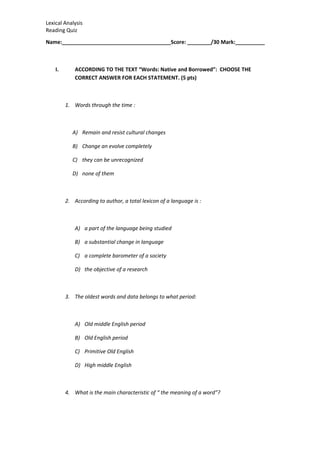
Words native and borrowed
- 1. Lexical Analysis Reading Quiz Name:_____________________________________Score: ________/30 Mark:__________ I. ACCORDING TO THE TEXT “Words: Native and Borrowed”: CHOOSE THE CORRECT ANSWER FOR EACH STATEMENT. (5 pts) 1. Words through the time : A) Remain and resist cultural changes B) Change an evolve completely C) they can be unrecognized D) none of them 2. According to author, a total lexicon of a language is : A) a part of the language being studied B) a substantial change in language C) a complete barometer of a society D) the objective of a research 3. The oldest words and data belongs to what period: A) Old middle English period B) Old English period C) Primitive Old English D) High middle English 4. What is the main characteristic of “ the meaning of a word”?
- 2. Lexical Analysis Reading Quiz A) It has a neutral relation B) It can be generalize in every idiom C) It has no relation D) It is arbitrary 5. In Old English vowels were: A) Only short B) Fricative and long C) Voiceless D) Either long or short II. Discuss about Indo European origins of the words and the relation it has with the development of words. 6 pts ___________________________________________________________________ ___________________________________________________________________ ___________________________________________________________________ ___________________________________________________________________ ___________________________________________________________________ ___________________________________________________________________ ___________________________________________________________________ ___________________________________________________________________ ___________________________________________________________________
- 3. Lexical Analysis Reading Quiz III. Explain and provide at least one example for Cognate and Non cognates words (6 pts) ___________________________________________________________________ ___________________________________________________________________ ___________________________________________________________________ ___________________________________________________________________ ___________________________________________________________________ ___________________________________________________________________ IV. From the chapter 3, Choose a topic or theme that calls your attention, write about it, provide examples and make a linkage with your professional development.(10 ptos) ___________________________________________________________________ ___________________________________________________________________ ___________________________________________________________________ ___________________________________________________________________ ___________________________________________________________________ ___________________________________________________________________ ___________________________________________________________________ ___________________________________________________________________ ___________________________________________________________________ ___________________________________________________________________ ___________________________________________________________________ ___________________________________________________________________ ___________________________________________________________________ ___________________________________________________________________ ___________________________________________________________________ ___________________________________________________________________ ___________________________________________________________________ V. Explain the influence that William the Conqueror had after the Norman Conquest in 1066. (3 pts).
- 5. Lexical Analysis Reading Quiz Name:_____________________________________Score: ________/30 Mark:__________ 1.- ACCORDING TO THE TEXT “Words: Native and Borrowed”: CHOOSE THE CORRECT ANSWER FOR EACH STATEMENT. (5 pts) 1.- Words through the time : Remain and resist cultural changes 2.- According to author, a total lexicon of a language is : a complete barometer of a society 3.-The oldest words and data belongs to what period: Old English period 4.- What is the main characteristic of “ the meaning of a word”? It is arbitrary 5.- In Old English vowels were:
- 6. Lexical Analysis Reading Quiz Either long or short II.- Discuss about Indo European origins of the words and the relation it has with the development of words (6 pts) Ss must be able to establish that this point of history was quite important in the word development process and it is consider the origin of the language as a central Key. III.- Explain and provide at least one example for Cognate and Non cognates words (6 pts) Ss must be able to provide an answer according to the text and illustrate with examples the difference between a cognate word and a non cognate one. IV.- From the chapter 3, Choose a topic or theme that calls your attention, write about it, provide examples and make a linkage with your professional development.(10 ptos) Ss must be able to connect with clear arguments and exposition the relation of their professional development and the topic they choose, in a coherent way and demonstrate way that part of chapter is useful to him/her. V.- Explain the influence that William the Conqueror had after the Norman Conquest in 1066. (3 pts). Ss must be able to locate the main events after 1066 and set the consequences of this historical event in which William the Conqueror had an important role.
- 7. Lexical Analysis Reading Quiz Either long or short II.- Discuss about Indo European origins of the words and the relation it has with the development of words (6 pts) Ss must be able to establish that this point of history was quite important in the word development process and it is consider the origin of the language as a central Key. III.- Explain and provide at least one example for Cognate and Non cognates words (6 pts) Ss must be able to provide an answer according to the text and illustrate with examples the difference between a cognate word and a non cognate one. IV.- From the chapter 3, Choose a topic or theme that calls your attention, write about it, provide examples and make a linkage with your professional development.(10 ptos) Ss must be able to connect with clear arguments and exposition the relation of their professional development and the topic they choose, in a coherent way and demonstrate way that part of chapter is useful to him/her. V.- Explain the influence that William the Conqueror had after the Norman Conquest in 1066. (3 pts). Ss must be able to locate the main events after 1066 and set the consequences of this historical event in which William the Conqueror had an important role.